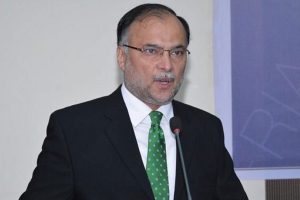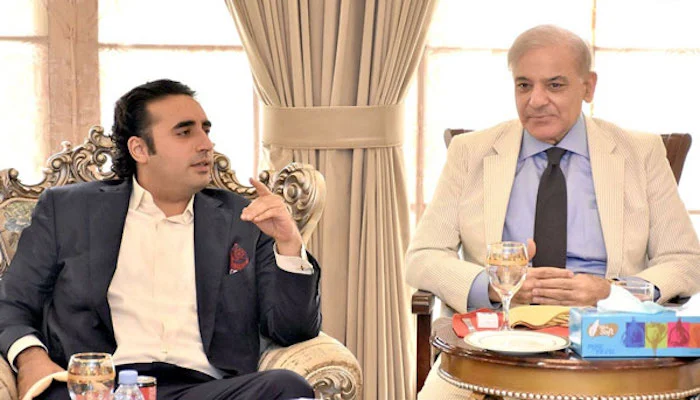On Monday, the federal government presented a new budget framework worth around Rs17.5 trillion to its key ally, the Pakistan Peoples Party (PPP). The PPP gave a nod to an 18% increase in defense spending, citing ongoing tensions with India, but expressed concerns that the allocation for development was lacking.
The PPP, which plays a vital role in supporting the government in the National Assembly, met with Prime Minister Shehbaz Sharif and his economic team to delve into budget discussions.
This year’s budget is set at less than Rs18 trillion, a decrease from last year’s budget, largely due to a significant drop in interest expenses following an 11% cut in the central bank’s policy rate.
Despite this, both the PML-N and the PPP agreed on the necessity to boost the defense budget in light of the recent tensions with India. Sources indicated that the PPP supported the proposal to raise the defense budget by 18%, bringing it to over Rs2.5 trillion, considering the current security challenges.
However, the two parties have differing opinions regarding the Public Sector Development Programme (PSDP) for the upcoming fiscal year. The government has suggested a Rs1 trillion PSDP, while the PPP is advocating for a larger allocation.
For the current fiscal year, Rs1.1 trillion was earmarked, but actual spending fell short of that figure. One participant proposed that the PSDP be set at the level of this year’s actual spending, which would be considerably less than the proposed Rs1 trillion.
Planning Minister chose not to comment on the PPP’s concerns regarding the low development budget allocation.

The government aims to uphold fiscal discipline and achieve a primary budget surplus that is double that of this fiscal year, in line with its agreement with the IMF to alleviate the debt burden.
The PPP has also been pushing for some tax relief for salaried individuals, who have really felt the pinch from the heavy taxes imposed in the last budget.
Sources shared with The Express Tribune that the government might consider taxing high-end pensioners, but there’s a possibility of offering some relief to lower-income salaried workers by raising their tax exemption limit and reducing rates across different income brackets.
There are discussions about introducing income tax for pensioners while simultaneously lowering rates for salaried employees, pending approval from the IMF later this month, as noted by a senior official from the Federal Board of Revenue.
According to recent discussions, there’s a possibility that the current tax-free monthly salary limit could be raised from Rs50,000 to just over Rs83,000. Thanks to the progressive nature of the tax slabs, this change would also benefit those with higher incomes. Officials have mentioned that talks are underway to lower the income tax rate by 2.5% across all existing slabs, which would effectively bring down the overall effective income tax rate by 3%.
Sources indicate that there are recommendations to increase the income thresholds for each slab rate to help ease the financial burden on taxpayers.
The salaried class has felt the brunt of the last budget introduced by Prime Minister Shehbaz Sharif’s government. A hefty 35% tax was imposed on monthly incomes exceeding Rs333,000, but this might be reduced by 2.5% alongside the increase in the tax-free limit.
Additionally, a 5% tax rate on monthly earnings of Rs100,000 is also on the table for adjustment. For those earning Rs183,000 a month, the current 15% income tax could potentially be lowered to 12.5%.
For incomes above Rs267,000, the government currently charges a 25% tax, which might be reduced to 22.5%. There’s even a suggestion to introduce a new slab with a 20% rate, although it may face scrutiny from the IMF, which prefers no more than four tax slabs.
For monthly incomes up to Rs333,000, the tax rate stands at 30%, but there’s a chance it could be lowered to 27.5%.
PML-N Senator Anusha Rehman emphasized on Monday that the government should provide relief to the salaried class and focus on traders instead.
As reported by The Express Tribune, the salaried class contributed Rs391 billion in income tax over just nine months, accounting for 10% of the total income tax collected in Pakistan. In contrast, traders only contributed Rs26 billion, which is a mere 0.6% of the total income tax revenue.
The top official from the FBR mentioned that pensions are considered a source of income and, as such, they need to be taxed. There was a proposal to tax pensions last year, but it ended up being put on hold. The idea is that pensions should be taxed at a rate that’s at least four times lower than regular salaried income.
Currently, the tax-free income threshold is set at Rs50,000 per month, but the authorities are looking to tax pensions that exceed Rs200,000 monthly. If this goes through, it would primarily affect high-end pensioners, including retired judges, three-star generals, and former grade 21-22 bureaucrats.
For the upcoming fiscal year, the government aims to set a tax target of Rs14.3 trillion, which is Rs2 trillion or 16% more than this year’s revised target. They anticipate that an additional Rs1.5 trillion, or 12%, will come from the nominal growth of the economy.
However, the IMF is urging the FBR to finalize plans to collect an extra 4%, which amounts to over Rs500 billion in taxes, according to sources.
Sources also indicated that the FBR’s enforcement has improved, as shown by a 26% annual growth in collections, despite only a 7% nominal growth in the economy. They believe the government doesn’t need to implement new measures, but the Fund is pushing for action.
In the meantime, the Senate Standing Committee on Finance met on Monday to discuss budget-related requests from various businesses.
The poultry association pointed out that the FBR is imposing a tax of Rs5,190 on parent chickens, which they consider excessively high. FBR Chairman Rashid Langrial promised to look into this matter before the budget is finalized.
The Pakistan Dairy Association has once again requested a reduction in the sales tax on packaged milk from the world’s highest rate of 18% down to 5%, as the tax imposed last year has negatively impacted sales. Rashid Langrial informed the committee that three proposals are being considered to lower the rate to 5%, 10%, or 15%, but no decision has been made yet.
FBR member Dr. Najeeb Memon pointed out that slashing the sales tax rate to 5% could lead to a revenue drop of between Rs20 billion and Rs30 billion. The association believes that with sales already declining, the FBR is falling short of its targets.
Atika Mir, representing the Fruit Juices Council, suggested reducing the federal excise duty from 20% to 15%. She highlighted that the heavy tax burden has caused a staggering 45% drop in sales for companies over the last two years. This increased taxation has also hit farmers hard, leading to a 66% decrease in demand for mangoes used in juice production.
In response to a significant revenue shortfall, the government took an unusual step on Saturday by issuing a Presidential Ordinance to swiftly recover taxes directly from taxpayers’ bank accounts, following rulings from the high courts and the Supreme Court of Pakistan.
On Monday, Prime Minister Shehbaz Sharif instructed the Ministry of Information to communicate the true rationale behind the ordinance to the public.
For the latest updates and insights on new developments, visit the NEWSON
Q1. What is the key focus of the new budget presented by the federal government?
The new budget, worth around Rs17.5 trillion, focuses on fiscal stability, with an emphasis on defense spending due to tensions with India, while also addressing development concerns.
Q2. Why did PPP approve an 18% increase in defense spending?
The Pakistan Peoples Party (PPP) agreed to the defense spending increase citing ongoing security challenges, especially tensions with India, while also raising concerns about the allocation for development.
Q3. What is the proposed budget for defense spending in the upcoming fiscal year?
The defense budget is proposed to increase by 18%, reaching over Rs2.5 trillion to address current security challenges.
Q4. Why is the PPP concerned about the Public Sector Development Programme (PSDP)?
The PPP is advocating for a larger allocation for the PSDP, as they believe the proposed budget of Rs1 trillion does not adequately meet the needs for national development.
Q5. What tax changes are being discussed for salaried individuals?
Discussions are ongoing to provide tax relief for salaried individuals, including raising the tax exemption limit from Rs50,000 to over Rs83,000 and reducing tax rates across different income brackets.
Q6. Will pensions be taxed in the new budget?
Yes, there are discussions about taxing high-end pensions exceeding Rs200,000 per month, primarily affecting retired judges, generals, and senior bureaucrats.


